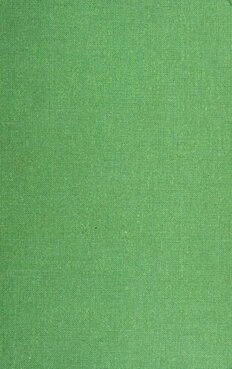
The Foundations of knowledge PDF
Preview The Foundations of knowledge
NUNC COGNOSCO EX PARTE TRENT UNIVERSITY LIBRARY Digitized by the Internet Archive in 2019 with funding from Kahle/Austin Foundation https://archive.org/details/foundationsofknoOOOOpapa THE FOUNDATIONS OF KNOWLEDGE T h e Foundations ot Knowledge Evangelos P. Papanoutsos Edited, and with an Introduction by JO H N P. A N TO N Translated by BASIL COUKIS and JO H N P. A N TO N STATE UNIVERSITY OF NEW YORK PRESS A L B A N Y , N E W Y O R K Copyright (c) 1968 by Evangelos P. Papanoutsos All rights reserved. Library of Congress Catalog Card Number 68-19533 Printed in the United States of A PROLOGUE The inquiry into the foundations of knowledge is a systematic in quiry into the problem of truth. This problem constitutes one of the three main concerns of philosophical analysis, the others being the problem of beauty and the problem of goodness. The first contributions to this inquiry were made by the ancients: the Sophists, Socrates, Plato and Aristotle. But the truly great growth of this branch of philosophy did not come until the seventeenth and eighteenth centuries, when the problem of truth became the central concern of philosophers. Most intimately associated with this develop ment in philosophy are the names of Descartes and Kant. For Descartes a solution to the problem of “method” and for Kant a solution to the problem of the “conditions of knowledge” preceded any other type of philosophical inquiry. The basic question in modern philosophy has thus been how certain knowledge is attained and verified. Until this question is answered, modern philosophers have not believed it pos sible to give a firm and reliable explanation of man's external and internal world, or—what amounts to the same thing—to reach scientific truth about the world and man. Viewing in retrospect the spectacular gains in the natural and social sciences over the last four centuries, we can say with confidence that this progress was due in no small measure to the unceasing philosophical interest in the “method” and the “conditions” of knowledge—what is now called “epistemology.” The record of modern science teaches us that the student of the natural and social sciences can hardly hope to achieve worthwhile results unless he has clarified in his own mind the conditions and standards of scientific truth. In this he differs from the artist, who has no need of special training in aesthetics to fulfill his function successfully, and from the moral man of action, who needs no schooling in ethical theory to alert him to the nature of his duty and the method by which to execute it. The present investigation is a critical one. The language of philos ophy calls critical (by contrast with dogmatic) that line of reasoning which, before accepting a given truth, demands and examines its PROLOGUE credentials. Critical philosophy adheres to this principle regardless of where a truth may originate and regardless of the pretensions with which it may be presented. Critical thought owes its power to the uncompromising investigation and self-examination it constantly conducts, in order both to determine the criteria of warranted knowl edge and to mark with the utmost accuracy the limits beyond which it cannot proceed. Thanks to critical thinking, theoretical consciousness has been able to confine both its objects of investigation and its am bitions to the realm of the possible—within the limits of human understanding. Due to the exertions of the critical mind the edifice of science is now more solidly built and far more stable than in any other period in the past. Undoubtedly, the objectives and results of critical thinking are difficult and sometimes even unpleasant. For nobody gives up his expectations easily: either because a man is accustomed to considering some beliefs as certain or because he cannot give up his convictions, he does not welcome the scrutiny of what, for him, is absolutely settled. But without determination and sacrifices the mind can neither discover nor evaluate the real treasures which may lie hidden underneath the sham. It must demolish first and build afterwards; and if it values certainty, it will demolish much and build little. The exercise of critical thought is therefore a painful task; and, since it requires the mind to be constantly and intensively on the alert, it constitutes a very difficult accomplishment for the limited powers of man. In essence, the whole effort of philosophy at the supreme moments of its history consisted in preparing and training critical thought, which would save man and the dignity of man from the dangerous fascination of dogma tism. The most brilliant minds worked in that direction: Socrates, Plato, Aristotle, Descartes, Hume, Kant. Nevertheless, philosophical thought can never be sufficiently critical; it continually tries to become even more so, precisely because it knows how powerful the attraction of dogmatism is. Our investigation hopefully will show why it is that only when philosophic thought explores the epistemological topics in a strictly critical fashion does it succeed in rising above the traditional anti theses (realism and idealism, empiricism and rationalism, pragmatism and intellectualism, etc.), and is thus able to reach a new and more stable position. It may well be that the various “isms" make useful chapter headings, but in the end they lapse into unacceptable over simplifications. They deprive problems of their third dimension; they supply too many facile solutions. Actually, all “isms” represent more or less dogmatic extremes: developments and variations on the theme
